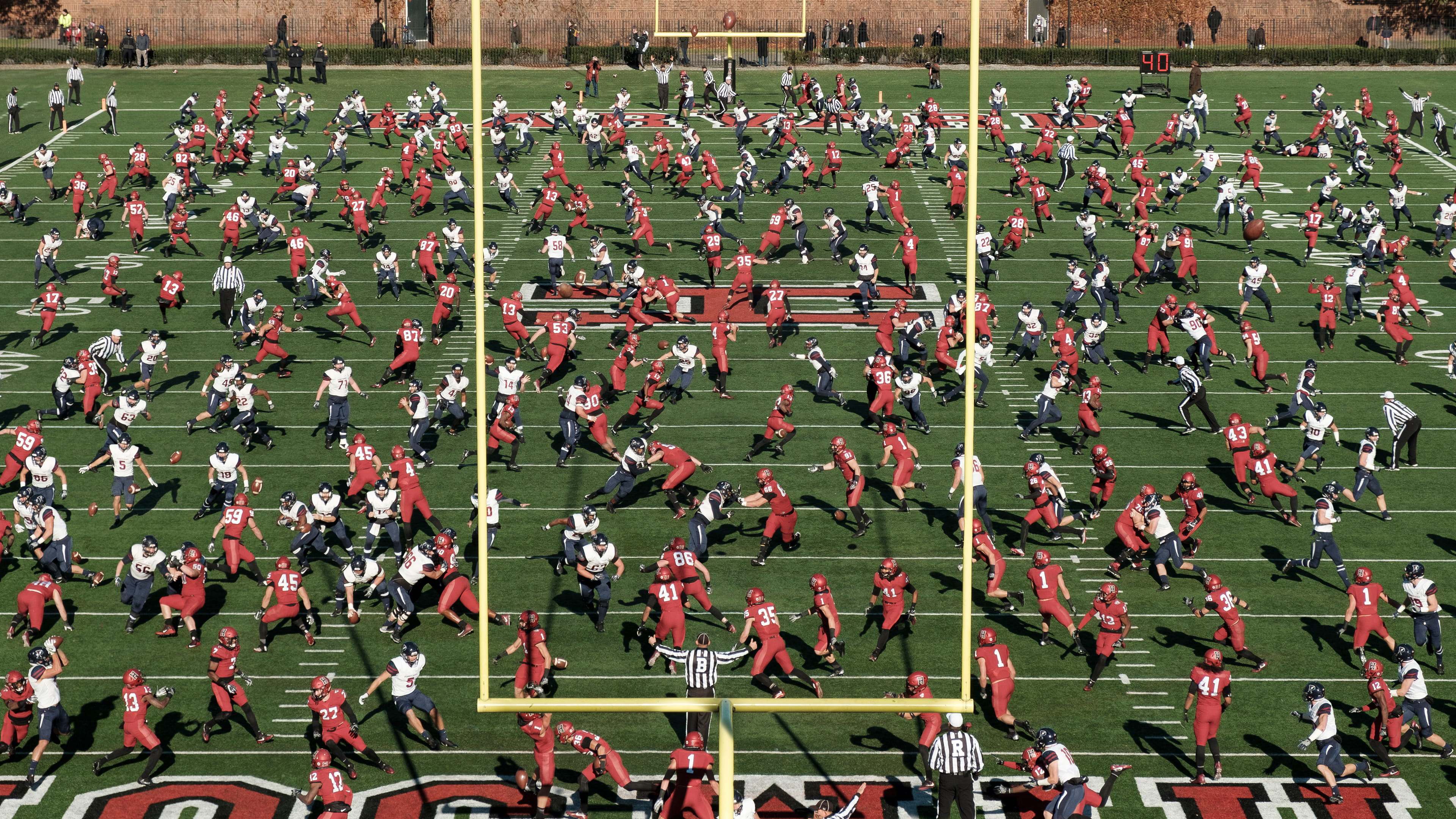You never know if a failed barbecue will lead to a scientific publication, but sometimes it happens.
Mario Molina and Mauricio Bucca – two Chilean sociology students at Cornell University – were introduced to the card game known as President by a few American friends during a barbecue in the summer of 2015. The goal of the game is to get rid of your cards as quickly as possible. The way you can do this is governed by some simple rules.

The first rule of President is: if you have a card that is higher than the card on the table – for instance, you’re holding a nine of diamonds and there’s a three of hearts on the table – then you may put your card on the stack. You need to stay alert, and some cleverness helps, but you’ll mainly win or lose based on the cards you get – the higher the better. This lack of player influence is reinforced by the second important rule of the game: the winner of one round gets the loser’s best card at the beginning of the next round.
In short: President is mainly a game of chance, not skill. But after playing President for a few hours, Molina and Bucca noticed something strange. If people won a game, they talked about it as if they had single-handedly achieved that result – as if they had played better than the losers. Even though it seemed really clear that the game was mainly decided by luck.
Molina and Bucca could not restrain themselves. Barbecue or not, they tackled the topic. As Bucca puts it: “I said, can’t you see that there is no way to play this game right? Look at the rules: the game is set up to make it unfair.” Molina adds: “We said, ‘this game is a lot like life. Success is partly determined by chance, and once you are successful, you will get opportunities to become more successful’.”
It may then not come as a surprise that President is sometimes known as “Capitalism”.
But Molina and Bucca’s fellow players refused to go along with their sociology analysis; it was just a game and certainly not unfair, and only losing players would object. The barbecue became a bit uncomfortable, but the confrontation also turned out to be a blessing in disguise. The following Monday morning, Molina and Bucca had an idea for an experiment.
Would most people think the same way as their fellow players from the barbecue?
What winning does to you
To figure this out, they created a simpler version of the game, which they called The Swap Game. It involved only two players, had fewer rules, and one major modification: the winners of a round would get the two best cards from the loser in the next round – one more than in the game of President. The aim was to clarify the unfairness of the game and the element of chance.
The researchers trained a number of volunteers on Amazon Mechanical Turk – a site where scientists score test subjects – and then let the "Turkers" play The Swap Game for days. After each game, they asked the participants if they thought the game was fair, what they thought of their own performance, and how they felt.
The outcome turned out to be the same as the game with friends during the barbecue. Even if the game was clearly determined by chance, and even if the contestants acknowledged that (and how could they not), by far most of the winners felt that they had played better than the losers – and therefore felt that they had earned their win.
Molina and Bucca concluded in Science Advances: whether people think something is fair depends not only on the rules but also on whether they win or lose. In other words: most people are reasonable human beings, except when they win.

Even pure luck is claimed as personal achievement
Molina and Bucca’s findings fit into a fascinating subgenre of economic, sociological, and psychological research on cognitive dissonance that can be summarised fairly simply: “If I succeed, it is because of my talent; if I fail, it is due to circumstances.” More generally, people are almost entirely unable to separate the role of the person from the role played by the surrounding circumstances.
In an experiment, participants in a role-playing game were randomly assigned job titles, such as manager or clerk. Afterwards, all the participants gave each other a score for characteristics such as intelligence, leadership, assertiveness and commitment. The outcome? The clerks rated their managers higher on all traits except hardworking. The managers thought they and their fellow managers were better at everything.
It was strange: even though the “success” of the managers had come about completely arbitrarily, through an appointment purely based on chance, people still “perceived” the higher qualities of the managers and the lower qualities of the clerks. They were confused by the status of the job titles.
In another experiment, students took part in a knowledge quiz. They were randomly assigned as quizmaster and participant. The quizmasters were allowed to ask all sorts of strange questions. Category: “What is the capital of Burkina Faso?” Or: “What is the name of the substance that whales excrete that is used to make perfume?” Afterwards, the researchers asked all participants and spectators who they considered the smartest.
The prevailing answer? The quizmasters. Which was absurd, because of course it is easier to come across as smart if you can come up with your own questions – and of course you won’t look as smart if you don’t know the answers. Being allowed to ask the question is a huge advantage. But as many of these studies have shown, people are almost entirely unable to separate luck from skill. And if they themselves are the ones who are lucky, then it is impossible – they think it’s their skill all the way.
In most of these studies, it was possible to make a case, no matter how flimsy, that someone was in fact capable. The quizmasters did ask difficult questions; the managers had actually managed things. No matter how flimsy the evidence was, the people who judged them could find something to explain their decision. But The Swap Game, the experiment by Mario Molina and Mauricio Bucca, took it one step further.
“What was new about our research,” Molina says, “was that winners had to evaluate the game’s outcomes under different levels of opportunities, and with no evidence to claim: I won because I played it smart. Even when the situation is clearly determined by their opportunities, when the game is clearly rigged, winners still considered the game fairer than the losers did, and even thought that they won by being the better player.”
As chance plays a bigger role, awareness of that role decreases
And don’t bother trying to convince winners that their success was also a matter of luck – in an experiment or in real life. “Luck is not something you can mention in the presence of self-made men,” US journalist EB White wrote in One Man’s Meat back in the 1930s.
What was true at the time has only become even stronger now. There are more and more self-made men and women, and they are becoming increasingly proud of and convinced of their own class, says economist Robert Frank, who thinks this is because more and more parts of the economy have become a winner-takes-all market.
In his book Success and Luck, Frank presents a sexy example of this: the market for software that helps you do your tax returns. This market was once dominated by accountants; in the age of computers, it became a software-based market. It also became clear pretty quickly what the best program is – and that best program (Turbo Tax) quickly claimed the lion’s share of the market, since software is easy to reproduce and distribute. (Compare this with the best chefs: they do not have such economies of scale.)
This means that now there is more money to be gained for “the winners” in the modern economy – from software to musicians, from actors to Amazon – than there used to be. The consequence of that high reward is that more talented people are trying to win that “prize”. And the consequence of this increased struggle between highly competent people – and this is sometimes difficult to understand – is that it is actually luck or chance that plays the decisive role.
Here’s the thing. Success is the sum of talent, hard work and luck. When many talented, hardworking people have to compete for success, the difference in quality between the best of the best is only minimal. The consequence? A highly skilled participant experiencing a little bit of bad luck will lose to a slightly less skilled participant who is luckier.
Indeed, as per Frank’s calculations, the best candidate only wins in a small number of cases. In a hyper-competitive economy, chance determines who wins more often than not, and more so than in the past. And now for the last counterintuitive plot twist: at the same time, the awareness of the role of chance or luck decreases. In other words: the belief in one’s own ability, in the self-made nature of achievement, that one owes success to oneself, increases.
The explanation is that the hard work was indeed necessary for success. If you’re biking into the wind, you’ll feel the difference right away. You have to pedal harder, you’re sweating, you’re getting tired. If you have tailwind, it feels different: after a while, you don’t even notice its assistance anymore. We all know the pictures of people heading into a strong wind, Frank writes, but it’s far more difficult to capture an image of the wind at your back – almost as if it were invisible. (Just try and google it. It’s true.)
In short: you tend to forget the luck factor and the wind at your back; you do not forget the headwind and the hard work.

The baker who kept calling
Now, using this perspective, take a look at the career of the new head coach for Dutch football club PSV Eindhoven: German football coach and former player Roger Schmidt.
The fact that Schmidt became a football coach at all can be attributed to a casual encounter with a baker. Although you cannot even call it that, since Schmidt had no clue at the time. On a spring day in 2003, when Schmidt was 36 years old and playing for SC Paderborn, he and two friends were watching a match played by a neighbouring club, Delbrücker SC.
Their comments on the match were overheard by Heinz Austerschmidt, now 85 years old, who was the founder of a large bakery that bore his name and also the main sponsor and chairman of Delbrücker SC. “The way he [Schmidt] spoke about the game, clear, without cliches, that impressed me,” Austerschmidt said on the phone. Exactly what Schmidt had said that day, Austerschmidt no longer recalls. “But he explained very clearly what was happening on the pitch. And I thought: I MUST have that man. As our coach.”
Talking with Austerschmidt on the phone is more like speaking to an excited 25-year-old than a not-so-fit 85-year-old, except that he’s talking in somewhat outdated German. He sometimes talks REALLY LOUD. Not because he is hard of hearing, but because he’s VERY EXCITED about “den Roger”.
Those few chance remarks by Schmidt along the sidelines resulted in Austerschmidt trying to persuade him to become Delbrück’s coach “for a year and a half”. A year and a half? “Well, a year and a half ... ” says Austerschmidt. “Maybe it was a year, or nine months. I’M AN OLD BASTARD NOW, YOU KNOW, I DO NOT REMEMBER THINGS SO CLEARLY ANYMORE. BUT IT FELT LIKE IT TOOK FOREVER.”
Austerschmidt could have stopped calling. That might have made more sense. But he persisted. Until he finally got Schmidt’s wife Heike on the phone in the spring of 2004. Austerschmidt remembers it like this: [Heike:] “Ro-ger, it’s that man again, who keeps calling all the time, Mr ... ” [Roger picked up the receiver] “ ... Austerschmidt.” [To Austerschmidt:] “Mr Austerschmidt, you again?”
Yes, him again. And that one time Schmidt finally accepted his invitation – Austerschmidt also doesn’t know why, exactly. Schmidt would do it for one season, become the coach for Delbrück, in addition to his job as an engineer at car supplier Benteler. In the end it became three; three seasons that Austerschmidt can easily talk about for hours on end – and also will.
"That guy you got," says Austerschmidt, referring to Schmidt’s coming to PSV, "he is great. A WON-DER-FUL coach. What Roger Schmidt has achieved has been nothing short of a TOP PERFORMANCE. He took a MEDIOCRE TEAM suffering from lots of injuries, and created eine top Mannschaft that went directly to the Oberliga [the fifth-level football league of Germany].”
“And that happened because of a header from our central defender in the last minute of the last game of the season. A giant TWO POINT ONE METRES TALL. I’ve got his number right here, just wait a minute.”
The hulky hard man who headed the ball home
The giant is called Dominik Hansjürgen, isn’t 2.01 metres tall but 2.05, nowadays works as a physiotherapist, and has told the story of that one goal by his conservative estimation about 500 times already.
How he jogged forward on that Saturday afternoon at 16:44, dragging his feet in exhaustion. How they had already been playing with 10 men – tied 2-2 – for half an hour. How their rival had already ended their game for the title in a tie. How Delbrück would become champion if they won the game. How he – as agreed beforehand – had sprinted to the first post. How the ball ended up perfectly on his forehead. How the ball flew into the goal. How Delbrück was promoted to the next league.
How he had sprinted to the corner flag and how everything and everyone piled on top of him. And how little he remembered from that moment on until the next Tuesday morning. Two months ago, he told me the story again, and a couple of days later he did it once more, this time in a video for a broadcast by German television programme Sportschau.
That one goal by Hansjürgen turned Schmidt into a regional celebrity, a coach with an undeniable shine, a coach in the spotlight. After three years of playing with the amateurs in Delbrück, he spent three years with the semi-pros at Preußen Münster, followed by an excellent season with underdog Paderborn in the second Bundesliga, and two very successful seasons with RB Salzburg. In 2014, Schmidt transferred to a truly top-ranking club: Bayer Leverkusen.
In short: quite the career for someone who was only a mediocre amateur player, an engineer who had never had the desire to become a coach, until a stubborn baker heard him say a few clever sentences on the sidelines of the football pitch and kept calling and calling, and a physiotherapist-defender who turned it into a fairy tale in the last minute of the last game of his first season.
Lucky, in other words.
The redundant player who scored immediately
And even in Leverkusen, everything went swimmingly – helped along by some good fortune at an ideal time.
Explaining the background will take two whole paragraphs on football tactics. At all of his clubs, Schmidt has used an extreme playing style. After losing the ball, he makes his team hunt the ball immediately, collectively and without stopping. If the team has regained the ball, the idea is to get a shot at the goal within 10 seconds. It’s all forward play, seldom backwards or sideways. It’s breathless football, like it was played virtually nowhere else when Schmidt introduced it.
Such an unconventional style was fitting for a club like Paderborn, which did not have deep pockets: as a club with the lowest budget in the league, you needed to use an underdog tactic if you wanted to have a chance against the wealthier clubs. In Salzburg, the style was encouraged because Salzburg as a club wanted to be unconventional: his boss, Ralf Rangnick, is considered to be the most experiment-happy football figure in the world.
But Leverkusen was a different case. There, Schmidt’s playing style was riskier.
Leverkusen was and is a big club which – like most big clubs – has a somewhat ambivalent relationship with innovation. On the one hand they had ambition: with Schmidt and his extreme playing style, the club had a chance to compete with richer clubs like Borussia Dortmund and Bayern München. On the other hand, there are the more conservative forces. What if things go wrong? Wouldn’t that make us the laughing stock of the league with these bizarre tactics?
But Schmidt made no concessions. He let Leverkusen play at least as extremely as Salzburg. His first match in charge was a huge test right off the bat: an away match against Borussia Dortmund in front of 80,000 spectators. As a winger playing in the starting formation: Karim Bellarabi, a player the club had wanted to sell in the summer but were unable to. No one wanted to have him.
The referee blew his whistle, and then it happened. Leverkusen didn’t pass the ball backwards, as 99.9% of all teams do, but forward, as if it were the last minute and a goal had to be scored. And then: a simple pass; a pass through the legs of a Dortmund midfielder; a poked pass to Bellarabi; an outside of the boot-tap through the legs of a defender; and then, just before the last defender could put a foot in front of it, a punter under the goalkeeper.

Et voilà: the fastest goal in the history of the Bundesliga. If the players still had any doubts about the strange new kind of football that their new coach was making them play, they were probably gone at that point.
‘Without that goal, I would still be an engineer today’
After his resignation from Leverkusen, Schmidt left for Beijing Guoan. In terms of sporting achievements, this was considered a step down; nobody goes to China for glory. Financially, it was a whole different story. In his recently published book Roger Schmidt, Das Buch eines Trainers (The Book of a Coach), he doesn’t mince any words. “The economic aspect play[ed] the decisive role.”
That is a rare statement. (Usually career switches to China or to Arabic countries go hand in hand with cliches about "accepting new sporting challenges", "broadening one’s horizons" and cultural change.) What’s also rare is Schmidt’s tendency in the book to accept the role of chance in his career. Football people are usually not the most modest types.
And maybe that makes sense. After all, football is one of those sectors described by economist Robert Frank: an economy in which a large number of talented people compete for a small number of positions and in which the “winners” make it past fierce opposition to earn enormous sums of money. (The crux is the scalability of the game due to the rise of pay-per-view TV).
In essence, there are all kinds of reasons for Schmidt to attribute his success to his hard work and talent and overcoming opposition. But if you look at the modest number of interviews Schmidt has given in recent years and read his book, you see something else.
Recently, as a promotion for his book, he spoke with German football magazine 11 Freunde, about HEINZ AUSTERSCHMIDT, and the 2.05-metres-tall defender Dominik Hansjürgen and his legendary last minute goal. “Without that goal, I would still be an engineer today,” Schmidt said. “I might have stuck to [the coaching job] for another year, but then I would have quit.”
Schmidt writes in the book itself: “You can end a season at a much lower position than you deserve, even if you were the better club in many games.” And: “You need a certain humility for the final score and you can only try to increase the chance of success.” He sees his career turns as Schicksal [fate or destiny]: “If people are willing to go through so much trouble for me, then I was apparently destined to become a trainer.” And: “The extraordinary thing about football is, even if you do almost everything right, you can still lose.”
Schmidt’s respect for luck even takes it one step further: it is the basis of his super-fast playing style. As Schmidt explained in 2015 in the Kölnische Rundschau: “I do not believe that a patient buildup of an attack is the road to success. There is much more chance in football than everyone believes or admits. If you want to reduce the influence of chance, you need to make sure that you’re playing in front of your opponent’s goal as often as possible. That is where you benefit more from chance than in front of your own goal.”
Humility is contagious
Some would say Schmidt is doing it wrong. A successful sports manager who wished to remain anonymous once confided to me that you have to claim the successes of your team, or at least not put them into perspective, even if they were the result of pure chance. After all, if it goes wrong, critics will blame it all on you, even if it’s for bad reasons. That sense of shame for your own opportunism is the price you pay for the status.
It happens – and frequently. Just think of politicians, who all too often claim successes – low unemployment, rising stock market prices, economic growth – where they hardly had any influence over. (Take Donald Trump and Jacinda Ardern.)

According to sociologists Molina and Bucca, this is no coincidence. Bucca says: “The elites are much more inclined to believe in a meritocracy. In schools they are already more self-confident than people from a lower social class, but it is also taught to them. To claim their success, to be assertive.”
This is dangerous. The more that successful people attribute their success to their own efforts, the less they will do for the collective, Frank writes in Success and Luck. And the more the collective is neglected, the fewer people can experience luck. Good public facilities, Frank writes, “are the one form of luck that we as a society have some control over”.
The solution, Frank says, is not to frame successful people as just lucky. Elizabeth Warren and Barack Obama did that in their campaign commercials in 2012. “You built a factory – nice work,” Warren said. “But you transported your goods on the roads that we all paid for.” Self-made people responded with rage.
The more that successful people attribute their success to their own efforts, the less they will do for the collective
It is better, Frank says to ask successful people about the moments when they were lucky. “Their eyes will sparkle. Before you know it, you’ll be discussing how we (...) can also give others the opportunities to be successful.” Molina and Bucca also see it that way. They are working on a follow-up study: an experiment where the winners of a game like The Swap Game explain their own luck to other winners of The Swap Game.
Is that insight contagious? They already call it “Warren Buffett effect” after the billionaire who acknowledges how the system favours successful people – and has warned of a class struggle for years, as rich people pay less and less tax. Hedge fund CEO Ray Dalio even predicts violent conflict. To avoid that, it helps if you realise that you have been lucky. And that awareness continues to grow because of what Molina and Bucca call “social influence” – when people like Bill Gates, or the occasional sports coach, credit the role that luck plays in success.
So Roger Schmidt, Lady Luck’s very own football coach, will not only get PSV to play exciting football, but he will also save capitalism. But I probably read too much into the thoughts of a humble football manager.
This article first appeared on De Correspondent. It was translated from the Dutch by Joy Phillips.
Dig deeper
 Why hard work and specialising early is not a recipe for success
Life has been sold to us like a long sprint from A to B rather than a random walkabout that eventually lets you know the whole alphabet. This is unfortunate, ineffective, and disheartening.
Why hard work and specialising early is not a recipe for success
Life has been sold to us like a long sprint from A to B rather than a random walkabout that eventually lets you know the whole alphabet. This is unfortunate, ineffective, and disheartening.


